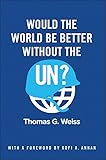Would the world be better without the UN? / Thomas G. Weiss.
Material type: TextLanguage: English Publication details: Cambridge, UK ; Medford MA. : Polity Press, c2018 Description: xvi, 220 pages ; 24 cmContent type:
TextLanguage: English Publication details: Cambridge, UK ; Medford MA. : Polity Press, c2018 Description: xvi, 220 pages ; 24 cmContent type: - text
- unmediated
- volume
- 9781509517268 (pbk.)
- JZ4984.5 W43 2018
| Item type | Current library | Collection | Call number | Materials specified | Status | Notes | Date due | Barcode |
|---|---|---|---|---|---|---|---|---|
 Books
Books
|
Ladislao N. Diwa Memorial Library Reserve Section | Non-fiction | RUS JZ4984.5 W43 2018 (Browse shelf(Opens below)) | Room use only | 77624 | 00078897 |
Includes bibliographical references and index.
Part One: Building Blocks -- "Three" United Nations -- Four UN Ailments -- Part Two: The World without the UN and its ideas and operations? -- A more violent world with diminished international peace and security? -- A more repressive and unkind world with diminished human rights and humanitarian action? -- A more impoverished and polluted world with diminished development? -- Part Three: The World with a more creative and effective UN? -- A Less violent world with more international peace and security? -- A Less repressive and unkind world with more human rights and humanitarian action? -- A Less impoverished and polluted world with more development? -- Let s be serious -- The UN we want (and need) for the world we want.
"Do we need the United Nations? Where would the contemporary world be without its largest intergovernmental organization? And where might it be had the UN’s member states and staff performed better?
These fundamental questions are explored in this hard-hitting, authoritative book by the leading analyst of UN history and politics, Thomas G. Weiss. While counterfactuals are often dismissed as academic contrivances, they can serve to focus the mind; and, here, Weiss uses them ably to demonstrate the pluses and minuses of multilateral cooperation. He is not shy about UN achievements and failures drawn from its ideas and operations in its three substantive pillars of activities: international peace and security; human rights and humanitarian action; and sustainable development. But, he argues, the inward-looking and populist movements in electoral politics worldwide make robust multilateralism more, not less compelling. The selection of António Guterres as the ninth UN secretary-general should rekindle critical thinking about the potential for international cooperation. There is a desperate need to reinvigorate and update rather than jettison the UN in responding to threats from climate change to pandemics, from proliferation to terrorism. Weiss tells you why and how."--Back cover
Fund 164 Creative Mind Books Center Purchased 09/05/2019 77624 NEJ PHP 1,796.00 2019-08-648 2019-1-0509

